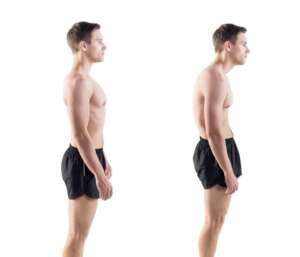
Forward head posture (FHP) is a common postural disorder that occurs when the head is held in a position that is extended forward of the normal alignment of the spine. FHP can be caused by a number of factors, including prolonged sitting, poor posture habits and weak neck muscles. FHP can have a number of negative effects on the body, including neck pain, headaches and shoulder pain. However, research has also shown that FHP can also have a negative impact on lung capacity and cardiovascular health.
According to one research article, forward head posture causes shortening and weakening of the accessory respiratory muscles. A closely related postural problem is when the middle back is hunched forward, called thoracic kyphosis, which also affects the ability for you to fully inhale air into your lungs, simply because the space for your lungs and rib cage is reduced. This forward head posture also creates upper back muscle tension, which reduces thoracic spine mobility and range of motion. Finally, the position of the head forward weakens at least 8 different muscles in your neck and upper back.
Breathing has traditionally been viewed as a purely mechanical process involving the expansion and contraction of the lungs. In the gravity field, the heart is central, acting as the body’s vital pump and orchestrating circulation to sustain life. By aligning posture and harnessing the power of gravity, individuals can enhance oxygen delivery, improve circulation and promote overall heart health. Research suggests that forward head posture may contribute to increased thoracic pressure and altered cardiac function. Additionally, this postural deviation can impede proper diaphragmatic breathing, limiting the efficiency of oxygen exchange and increasing cardiovascular strain.
As always, there are things that you can do to improve your posture and your cardiopulmonary health:
Practice Mindful Breathing – Incorporate mindful breathing exercises into your daily routine to enhance oxygenation and support cardiovascular health. Focus on deep, diaphragmatic breaths to engage the full capacity of your lungs and promote relaxation.
Maintain Good Posture – Be mindful of your posture throughout the day, especially when sitting or standing for extended periods. Keep your head aligned with your shoulders and spine to minimize strain on the neck and optimize cardiopulmonary function. Be mindful of how you hold your head while driving, working at a desk, and especially scrolling your devices.
Move Regularly – Sitting for more than 20 minutes at a time can lead to a host of issues. Incorporate regular physical activity into your lifestyle to promote circulation, strengthen the heart and lungs and improve overall posture. Incorporating activities such as yoga, pilates or cardio-type exercise can help maintain optimal cardiopulmonary health. Even going for a brisk walk several times per week can help.
Seek Professional Guidance – If you’re experiencing persistent forward head posture, cardiovascular symptoms or breathing issues, consider seeking guidance from a healthcare professional such as a chiropractor, a physical therapist or even an acupuncturist. A qualified practitioner can provide personalized recommendations and interventions to address underlying issues and support cardiopulmonary health.
Don’t let poor posture lead to poor health. If you’re someone who has postural problems or your work keeps you hovering over a computer all day, consider consulting with a practitioner other than your regular medical doctor. It might be the best decision you’ll ever make.

